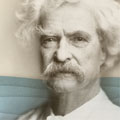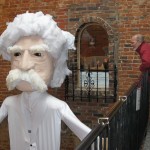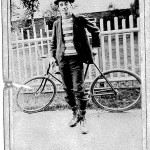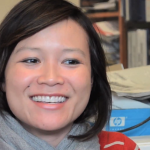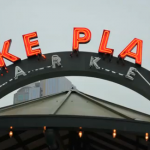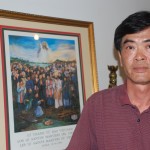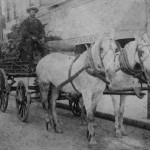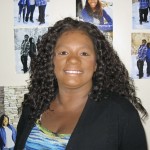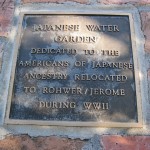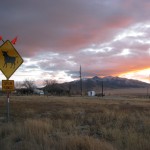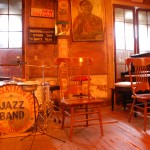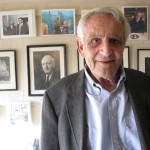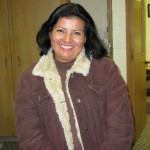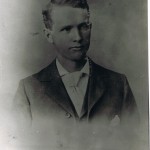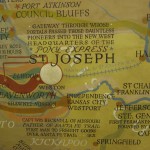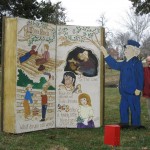Michael Fosberg plays the race card, literally.
He joked about it as he handed us his business card. “RACE” is emblazoned on the back in big black letters.
The other side listed Fosberg’s contact info and accomplishments: actor, writer, director, teacher and—perhaps the culmination of all of these things—diversity trainer.
We met Fosberg by accident. He led a post-show discussion about race relations after a performance of the Pulitzer prize-winning play Clybourne Park at Chicago’s Steppenwolf Theatre. We invited him to sit down for an interview after we heard his story that night.
Fosberg grew up as a white kid from Waukegan, Ill. While he was living in L.A. in his early thirties, he found out his mother and his step-father—the man who had raised him—were divorcing.
“I realized at this time that I didn’t really know who my biological father was,” Fosberg said. “And here I was losing my stepfather, and I decided perhaps I needed to know some information about [my biological father].”
Fosberg went on a journey to find him. “I knew his name and that 25 years prior to this he lived in the Detroit area—and this was before we used the Internet for everything—I went to the library and they had phone book sections.”
He looked up the Detroit section. “There were six listings and I copied down all the names and numbers,” he said, “and I went home and called the first number on the list, and it was my father.
“And during that phone call, my father proceeded to tell me, as he said, ‘a couple of things you should know I’m sure your mother’s never told you,’ one of which is that he’s African American.”
Fosberg had spent his entire life thinking he was white.
“Well, I was living in an apartment that was about the size of this chair at the time, but I remember being stunned, not so much from the idea of ‘Oh my God, I’m black’ but the idea that—let’s see, this is a big story—I’ve always felt my whole life, I’ve always felt a deep connection to African American people, to African American culture and I never could explain why. And so yes, indeed it was stunning to hear that I was half black, but it was also reassuring that all my life this deep feeling was verified.
“I remember looking across the room I lived in, it was a little apartment, and there was a mirror there, and I was sort of holding the phone, my dad was sort of filling me in on family history, and I kind of glanced over and caught a reflection of myself, and I thought Oh my God, did I just change? Have I gone black and then back to white? It was sort of a surreal experience.”
A lot of Fosberg’s friends weren’t surprised. An old friend called, and Fosberg told him what he had discovered.
“His response was, ‘Damn, I always knew you were black.’ And I was like why did you know that?” Fosberg said. “A lot of my friends had said this. They always had an inkling, and I don’t know, I suppose it’s pretty easy after the fact to say that, but people said, ‘You know, you were so cool, your hair, you had an afro.’”
Although Fosberg was furious with his mother for withholding his identity, his life became richer with the addition of a new family. (He made peace with her).
His unkown family history is indeed rich. He can trace his roots back to slavery. His great-great-grandfather was a member of the 54th regiment of the colored infantry in the Civil War. His grandmother’s father was an all-star pitcher for the Negro Leagues. His grandfather was a genius who started the science and engineering departments at Norfolk University.
For 10 years now, Fosberg has used his story as a springboard for talking to Americans about diversity. He published a book, and he performs his one-man show, “Incognito,” 60 to 70 times a year for schools, colleges, corporations and the government.
In the play, Fosberg discovers his identity at the same time the audience does.
“Some people are kind of disappointed,” he said. “To be frank, white audiences are sometimes more disappointed that I’m not more outraged, perhaps, by the discovery. And I am perplexed by that, because what would I be outraged about? Would being part black be outrageous or bad? I’m confused by that kind of response to it. I was overjoyed. I was like damn. I figured out who I am.”
Fosberg talks about dialogue. A lot, because it’s the key to improving race relations. He sees it in politics, in audiences and in the media. Fosberg said it seems like people want to have this dialogue, but they don’t know how to start it.
“There also seems to be a faction of people who feel like, ‘Oh man, do we have to talk about race?’” he said. “When in fact they haven’t really talked about race. They think they have. And that’s mostly from white people, almost exclusively. And then yes, the dialogue about race is so difficult to have.
“From a white perspective, when you’re in mixed company and you want to have a dialogue about race, white people approach the dialogue from a place of caution, because you want to be careful that you don’t say anything that sounds racist. How can you have open dialogue when you’re coming from a place of caution? You can’t. You can’t be open about it. On the other side of the issue, people of color are ready to pounce on anyone, anything that sounds remotely racist, and so we’re polarized, and we don’t have the dialogue.
“So what I’m suggesting is that we create this space where we can have this dialogue, and it’s not going to be easy, but we have to allow people to say whatever they’re gonna say and not jump on them like they’re a racist. There are definitely, definitely racist things being said all over the place. You see them, you hear them, but rather than jump to calling it racist, why don’t we have some dialogue about it?”
The same thing goes on in mainstream media. Most people are not engaging in the dialogue about diversity.
“I’ve been interviewed by all kinds of media,” Fosberg said. “I’ve been on CNN, All Things Considered, Tavis Smiley Show, blah blah blah,” Fosberg said. “Who has interviewed me to talk about race and identity? People of color. Those are the only people in the media who are talking about it. Why is that?”
The bottom line is that there is no understanding without dialogue, and there is simply not enough dialogue.
Fosberg was a captivating storyteller, and during our interview, he told us about his epiphany at the Inkwell on Martha’s Vineyard, and the man who was moved to tears at his show, and how he forgave his mother for hiding his identity for so long.
But dialogue, dialogue, dialogue. It always came back to dialogue.
A few days later, I struggled to write about our conversation. There was still one question, one that I hadn’t brought up because I thought it might be unprofessional or worse, stupid.
So I pulled out Michael Fosberg’s “RACE” card and called him.
He answered, despite it being well past normal working hours.
“Michael, I have a one more question,” I began. “So I’m a white girl. I don’t know how to start a dialogue about race.
“What questions should I even be asking?”
The difficult part, he said, is that there is an expectation to be an expert, but we don’t know all there is to know about race. No one does.
“Come up front and say, ‘Hey, I want to be honest, this is where I’m coming from,’” he told me. Everyone has a different experience with race.
“It’s up to you to discover and uncover what you know about race.”
He said I asked a good question.
Alyssa

